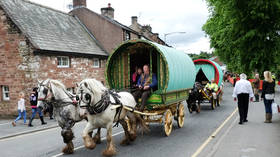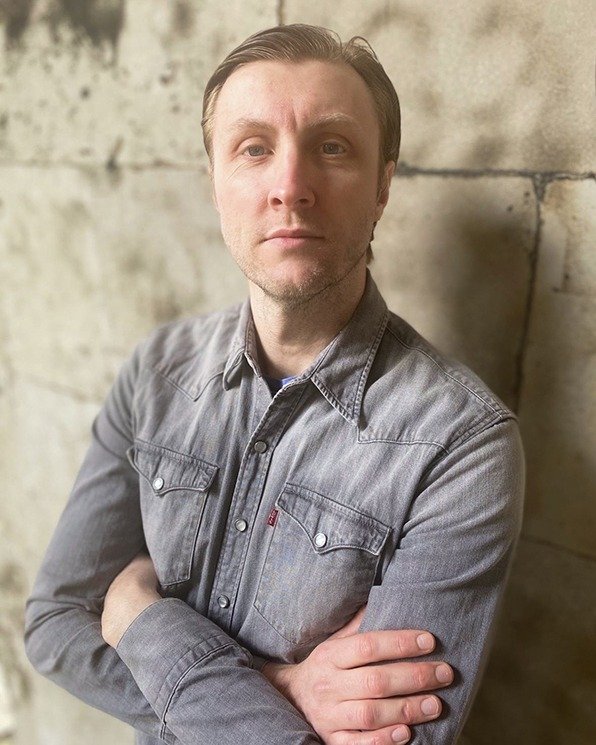If the UK is serious about tackling racism, it needs to address its unchecked bigotry towards travellers and gypsies

As the Black Lives Matter protests rage on, Britain should also be reflecting on how it treats a different minority. Discrimination against Irish travellers is so ingrained, it is virtually accepted.
‘No Blacks. No Irish. No Dogs’. That was a common sign in British boarding houses and pubs until the late 60s.
As people have become more enlightened, attitudes have changed – although, as we can see from the Black Lives Matter movement, progress remains slow. But the ‘No Irish’ issue is still relevant today, if not widely reported.
Also on rt.com ‘Kiss my shoes’: Two British teenagers arrested after video showing pair racially abusing black boy goes viralFor Irish, read traveller. They’re a group who don’t live in orthodox homes, preferring caravans and mobile dwellings. They move between sites and travel in groups.
They are almost all Roman Catholic and have a strong culture, which is why under British law they’re considered an ethnic group. Their males have a higher-than-average participation in work, whereas the opposite is true with the females. And it’s not uncommon for their children to be home-schooled.
Most of this is common knowledge, but what probably isn’t is the level of discrimination and hatred they have to endure.
Negative media coverage
Earlier this week, popular tabloid The Sun ran a story about travellers ignoring lockdown to attend the town of Appleby in Cumbria, where a famous horse fair has been held for the past 250 years. It’s been cancelled this year, but the implication was they had brazenly broken lockdown en masse.
Normally, 40,000 visit across the weekend. This time, a maximum of 100 people arrived for a few hours, and a spokesman for the traveller community explained their presence by saying: “There’s a charter to the fair and a very old cultural belief among our people that if there isn’t a horse deal done down on the sands or out in the field, the charter can be revoked. They did it in a very responsible way and with a common-sense approach.”
Also on rt.com Black Lives Matter in UK crowdfunds more than £700,000 in days, but do donors know the real ambitions of these radical activists?Lockdown concerns aside, what was shocking were the vile comments on The Sun’s website, which were not removed.
These included a cry to “burn them all”, while another stated “the only thing travelling trash do is destroy and ruin what is beautiful – they act like animals and should be treated as such”. To this, a fellow reader replied, "That’s an unfair slur on animals!” The racism was blatant and unchecked.
Of course, there are other countries in Europe that are hostile towards travellers, who tend there to be from a Roma background and are called gypsies. But in Britain, where there is generally vocal support for other oppressed minorities, discrimination against this particular group seems almost universally accepted.
Either term, traveller or gypsy, is frequently followed by a nod and a wink. The implication is that they are low-class, thieves, untrustworthy and not a valued part of society.
Tyson Fury’s experience
Another part of their culture is bare-knuckle fighting to settle disputes. One of the world’s most famous sportsmen hails from this background – World Boxing Council heavyweight champion Tyson Fury.
The self-styled Gypsy King is revered for his skills, and entertained millions when he stopped the previously unbeaten American Deontay Wilder earlier this year. The riches and acclaim haven’t changed everything, though.
As Fury recently explained, “I’m a white male, but I suffer racism in 2020, because I’m a traveller and come from an ethnic background. Even today, you go into pubs, bars and restaurants, and it may say on the door: ‘We reserve the right to not let travellers in’ or ‘No gypsies or travellers allowed’.
Also on rt.com Guardian writer Jones derided after promoting website seeking to topple Earl Grey statue, UK PM responsible for ending slavery"Me and Paris [his wife] went to go into a restaurant and they said,‘No gypsies allowed.’ I said, ‘I’m a heavyweight champion of the world, representing this country.’
“And they said, ‘Well, you’re a gypsy, aren’t you?’ It’s still acceptable to be racist towards travellers. Nothing ever gets done about it. No one ever says anything. It’s just accepted.”
The proof came in the mainstream media’s coverage of his comments – or lack of it. Fury’s frank words barely made a ripple, while the Black Lives Matter campaign has been afforded blanket coverage.
And the boxer’s experience is not uncommon. A famous court case saw pub chain JD Wetherspoon forced to pay £24,000 in damages for refusing entry to travellers.
Chelsea McDonagh from the Traveller Movement said: “Like most travellers, I’ve experienced being refused service or followed around shops, as well as the usual slurs: ‘pikey’, ‘knacker’, ‘gypo’.”
Police bias
A Traveller Movement report from 2018 found that 12 of 17 police officers and 13 of 14 community members identify unconscious bias or racism by police towards travellers.
One traveller revealed the sort of attitudes faced on a regular basis. “I was talking to a policeman the other day and he said to me, ‘Why are the majority of gypsies and travellers criminals?’” she explained.
The report also discovered that only two of the 43 regional police forces across England, Scotland and Wales had a strategy to engage with the travelling community.
Also on rt.com End imprisonment, reintroduce segregation, ban police: Seattle revolutionaries’ cartoonish ‘demands’ show they’re not seriousAnother report contained the horrifying statistic that 91 percent of travellers have experienced discrimination because of their ethnicity.
Of course, the public perception isn’t helped by how travellers are portrayed in the media. TV has broadcast a string of tacky, shock-value shows, such as “My Big Fat Gypsy Wedding”, which have caused dismay and anger in the community.
One female traveller said at the time it was aired,“The way us women come across in the programme is a disgrace. It shows us as nothing but slaves to the men, only good for cooking and cleaning, and always being available to open our legs to them. We don’t want that for our daughters.”
Failed by government
Even Britain’s traditional infrastructure is failing travellers. A government committee studied the issues and discovered there were problems with travellers’ access to the National Health Service and education.
Professor Alison McFadden commented: “There are subtle and not-so-subtle ways that people are restricted from registering with GPs. Sometimes, it’s not having the right paperwork and documentation, or not understanding what’s required for proof of address, or simply not being able to provide it. We heard cases where a surgery had asked to see a bank statement prior to registration.”
Also on rt.com Britain ‘not a racist country,’ Johnson believes, as BLM protests grip UK citiesTravellers are also the largest ethnic group to have persistent school absences, at over 60 percent. For black and Asian kids, in contrast, this figure is under 10 percent.
The committee’s summary was this: “Overall, we have seen a lack of engagement and cooperation between local authorities, schools, regulators and families, which has led to a perfect storm of poor outcomes.”
There are 197,705 travelling men and women in Britain who need shelter from that storm, and they need it now.
Think your friends would be interested? Share this story!
The statements, views and opinions expressed in this column are solely those of the author and do not necessarily represent those of RT.













